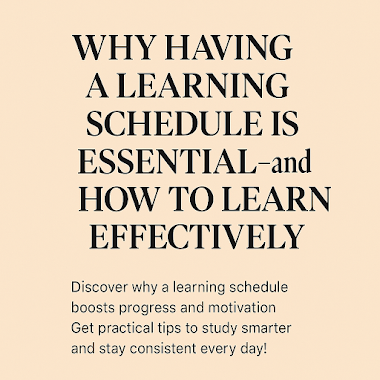Why Having a Learning Schedule is Essential: How to Learn Effectively
In today’s fast-paced world, learning a new skill or subject can be both exciting and overwhelming. With so many distractions: social media, work, family, and personal obligations, it’s easy to lose track of your learning goals. That’s why having a schedule is not just helpful, but essential. A clear learning schedule brings structure, consistency, and focus into your study routine, helping you stay motivated and make real progress over time.
One of the most powerful benefits of having a learning schedule is that it builds consistency. Learning something new, whether it's a language, musical instrument, or technical skill, is far more effective when practiced regularly. Instead of trying to absorb everything in one long session once a week, short and frequent study sessions allow your brain to absorb and retain information better. Dedicating just 20–30 minutes a day to focused learning can create lasting results over time, without causing burnout.
A schedule also helps reduce the feeling of being overwhelmed. When you’re faced with a big goal like “learn Spanish” or “study for an exam,” it’s easy to feel lost. Breaking your goals down into small, manageable tasks, like learning five new words a day or reviewing one grammar rule per session, makes learning more approachable and less stressful. Knowing exactly what you’re going to study on a given day keeps you focused and saves time.
Sticking to a learning routine also improves your ability to focus. When your brain becomes familiar with a set study time, it learns to expect concentration during that period. This mental preparation allows you to engage more deeply with the material. Think of your study time as an important appointment with yourself. The more seriously you treat it, the more productive you'll be. Over time, this habit becomes second nature.
Another often-overlooked benefit of scheduling your learning is the ability to track your progress. When you plan your sessions and record what you’ve studied, you can look back and clearly see how much you’ve improved. This not only builds confidence but also keeps you motivated to continue. Tools like learning journals, digital planners, or even simple checklists can be very effective for monitoring growth.
Creating a schedule is a great first step, but it’s equally important to learn effectively. Start by setting SMART goals: Specific, Measurable, Achievable, Relevant, and Time-based. Instead of saying “I want to improve my English,” you can say “I will learn 10 new business phrases this week.” Clear goals give you a purpose and a way to measure your success.
Active learning is another key to retaining knowledge. Rather than passively reading or watching, engage with the material. Practice with flashcards, complete exercises, write short summaries, speak out loud, or even try teaching the concept to someone else. The more you interact with what you’re learning, the deeper your understanding becomes.
Don’t be afraid to mix things up. Using a variety of learning tools, videos, podcasts, books, apps, and conversation practice, keeps your brain stimulated and prevents boredom. And of course, reviewing is just as important as learning something new. Revisiting what you’ve already studied helps move knowledge from short-term to long-term memory, especially when using methods like spaced repetition.
Lastly, remember to rest and recharge. Learning while tired or stressed is not productive. Taking breaks, getting enough sleep, and staying mentally and physically healthy will help you absorb more information and stay motivated in the long run.
In conclusion, having a learning schedule is one of the most effective ways to stay on track and make real progress in any subject. Combined with practical learning strategies like goal-setting, active engagement, variety, and review, your study sessions can become both efficient and enjoyable. So go ahead, grab your planner, create a routine, and take the first step toward your learning goals. Your future self will thank you!









Comments